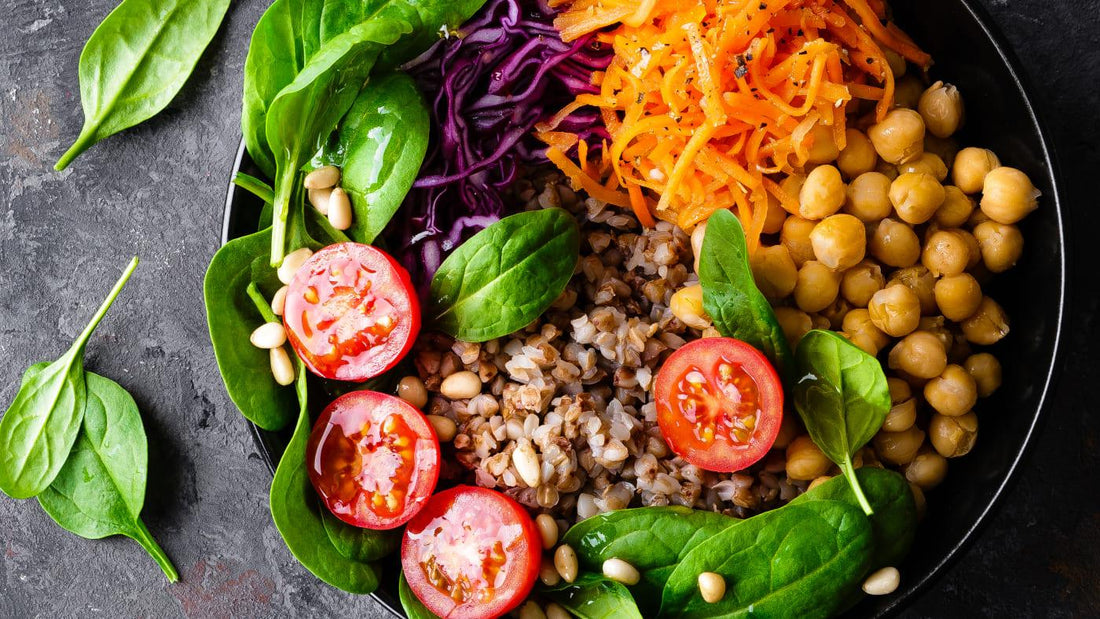As the Physicians Committee for Responsible Medicine state: "A varied plant-based diet of whole grains, vegetables, & beans, can easily meet your daily protein needs without the risks of animal products" [1]
Now is the time to power-up with plant-based protein to help save the planet, substantially boost your health, & show kindness to the animal kingdom

It's Super Simple to Switch!
"It’s easy to get all the protein you need without eating meat, dairy, or eggs.
An average woman needs about 46 grams of protein per day; the average man about 56" [1]
Substantial research shows that: "plant protein is the most beneficial source. And replacing red meat with zero cholesterol high-quality plant protein such as beans, nuts, or soy, may be associated with a lower risk of coronary heart disease.
Further, plant-based protein reduces risk of early death from any cause and from heart disease. And for each additional 3% of calories from plant protein the risk of dying lowers by 5%" [1]. - So are you ready to follow the vegan celebrities and multi-sport athletes who are thriving without animal protein?

Do you want to experience the massive benefits, and start upgrading to the healthiest form of protein?
Did You Know?
Have you heard about the studies that were carried out on the skeletons of ancient Roman gladiators? The findings showed that they were vegetarian and consumed large amounts of beans and barley.

Gifts from nature that provide simple, yet highly nutritious food, with a valuable amino acid profile of complimentary proteins!
The Low-Down
Protein and its components (smaller units which are known as amino acids), play a vital role in helping our body maintain, build, and repair body tissue.
This includes our bones, muscles, hair and skin. In fact, protein, which is classed as a crucial macronutrient, and divided into essential and non-essential amino acids ('essential' meaning that the body cannot manufacture them, and has to ingest them), is needed by every cell in our body.

It also helps fuel our energy, and is instrumental in the production of enzymes, hormones, immune system response, and blood clotting [2]. So let's take a look at the benefits of switching, and how vegans can protein-up!
Consuming the Right Amount of Vegan Protein
Variety is the spice of life, and you can easily consume the correct amount of protein and necessary amino acids, every day, by have delicious combinations. For example, different types of wholegrains with various protein-heavy vegetables; and pulses such as beans or peas and brown rice, broccoli and tofu, or oats with vegan protein powder.
Also, always try and go for a substantial percentage of fresh whole produce, rather than processed vegan options!

So, What Are Some of the Best Sources of Vegan Protein?
Tofu
Benefits
Tofu, made from soybeans, provides around 10 grams of protein per half-cup serving. It is also a good source of calcium, iron, and magnesium. Tofu comes in various textures, from silken to extra-firm, making it suitable for a wide range of dishes.
How to Use
Tofu can be grilled, stir-fried, baked, or blended into smoothies and desserts. Marinate it for added flavor or crumble it as a substitute for scrambled eggs.
Lentils
Benefits
Lentils are a fantastic source of plant-based protein, providing around 18 grams of protein per cooked cup. They are also rich in fiber, iron, and folate, making them a nutritious addition to any diet. Lentils come in various colors, including green, brown, red, and black, each with a slightly different texture and flavor.
How to Use
Lentils are incredibly versatile and can be used in soups, stews, salads, and even veggie burgers. Cook them with aromatic spices for a flavorful dish or add them to your favorite curry for a protein boost.
Chickpeas
Benefits
Chickpeas, also known as garbanzo beans, provide about 14.5 grams of protein per cooked cup. They are also high in fiber, iron, phosphorus, and manganese. Chickpeas are particularly popular in Mediterranean and Middle Eastern cuisines.
How to Use
Incorporate chickpeas into salads, soups, and stews. They can also be blended into hummus, roasted for a crunchy snack, or used as a base for veggie patties.
Quinoa
Benefits
Quinoa is a complete protein, meaning it contains all nine essential amino acids that our bodies cannot produce. It offers about 8 grams of protein per cooked cup and is also rich in fiber, magnesium, iron, and manganese.
How to Use
Quinoa can be used as a base for salads, added to soups, or served as a side dish. You can also use it in place of rice or pasta for a protein-packed meal.
Edamame
Benefits
Edamame, or young soybeans, offer 17 grams of protein per cooked cup. They are also high in fiber, vitamins, and minerals, including vitamin K and folate.
How to Use
Enjoy edamame as a snack, add them to salads, or mix them into stir-fries. They can also be blended into dips and spreads.
Tempeh
Benefits
Tempeh is another soy product that is fermented, giving it a firm texture and nutty flavor. It provides around 21 grams of protein per cooked cup. Tempeh is also rich in probiotics, which support gut health.
How to Use
Tempeh can be sliced and grilled, crumbled into salads, or used as a meat substitute in sandwiches and tacos. Marinate it to enhance its flavor and add it to your favorite dishes.
Black Beans
Benefits
Black beans provide about 15 grams of protein per cooked cup. They are also a great source of fiber, iron, and antioxidants. Black beans are a staple in Latin American cuisine.
How to Use
Use black beans in soups, stews, salads, and burritos. They can also be blended into dips or used as a base for veggie burgers.
Chia Seeds
Benefits
Chia seeds offer about 4 grams of protein per two tablespoons. They are also high in omega-3 fatty acids, fiber, and antioxidants. Chia seeds are known for their ability to absorb liquid and form a gel-like consistency.
How to Use
Add chia seeds to smoothies, oatmeal, and yogurt. You can also use them to make chia pudding or as an egg substitute in baking.
Hemp Seeds
Benefits
Hemp seeds provide around 10 grams of protein per three tablespoons. They are a complete protein and are rich in omega-3 and omega-6 fatty acids, as well as magnesium and iron.
How to Use
Sprinkle hemp seeds on salads, smoothies, and oatmeal. You can also blend them into protein bars and energy balls or use them as a topping for avocado toast.
Nutritional Yeast
Benefits
Nutritional yeast is a deactivated yeast that offers about 8 grams of protein per two tablespoons. It is also a great source of B vitamins, including B12, which is often lacking in plant-based diets.
How to Use
Sprinkle nutritional yeast on popcorn, pasta, and salads for a cheesy flavor. You can also use it to make vegan cheese sauces and dips.
Bolster your cooking repertoire by adding some of the following:
- Green peas
- Beans, such as split peas, kidney beans
- Nuts (e.g. peanuts and almonds)
- Nut butters
- Soy milk (unsweetened)
- Buckwheat
- Quinoa
- Spirulina
- Protein-rich vegetables (e.g. potato)
- Mycoprotein
- Seitan
- Bulgar
- Ezekiel bread
- Vegan protein powder
- Vegan protein bars
Being in the Know
Although plant-based foods normally house all the essential amino acids, they rarely provide a full array of essential and non-essential amino acids.

Moreover, a number of the amino acids may be in minimal concentrations.
But that's super easy to fix!
Given the barrage of misinformation across the internet, it's easy to understand the anxiety that potential vegans might feel about protein deficiency. However, science shows that this is completely unfounded!
Yet with millions of people turning to a plant-based way of life, it's crucial that all of us understand a few important points.

First of all, generally speaking, protein which derives from animals, tends to provide a full balance of amino acids. Conversely, plant-based protein is normally lacking various amino acids.
But this is not an issue - all it means is that we have to be diligent in combining a variety of food sources (that we enjoy), to ensure that we are getting a sufficient spectrum of amino acids for optimum health.
Is Plant Based Protein Good for Sports People & Athletes?
Vegan athlete and Doctor of Physical Therapy, Melissa Ball, is dedicated to giving athletes the low-down on how they can get all the nutrients they need, the easy way.

She notes that: "Athletes’ protein needs are based on their body mass, their type of activity/sporting demands; their overall caloric intake, and their fitness goals. On average, most athletes require 1.0-1.8 grams of protein per kg of body weight per day. This is the same for both vegan athletes and meat-eaters alike; vegan athletes do not inherently NEED more protein" [4].
No Longer on the Fringe - Isn't it Time You Put Plant-Based Food on Your Menu?
No longer seen as a fringe movement for cranks, veganism is now well and truly on the global map.
And the movement by those who want better health, brilliant anti-aging benefits, a greener planet, and respect for the animals, is now most definitely mainstream. This revolutionary change of the tide is partly due to the fabulous publicity that has, and is, being put out by vegan celebrities. As we approach the mid-2020s, individuals from every walk of life are becoming inspired by ethical and environmental interests.

They want to create a genuinely positive change by following a vegan diet. Once upon a time, those who only ate whole, plant-based foods, battled to find a platform to share their perspective.
But now, "thanks to vegan celebrities sharing the positive benefits of their plant-based diets, millions of fans have been inspired to give veganism a try!" [5].
Frequently Asked Questions (FAQs) about plant based proteins.
1. Can you get enough protein from a plant-based diet?
Yes, you can get enough protein from a plant-based diet by including a variety of protein-rich foods such as lentils, chickpeas, quinoa, tofu, edamame, tempeh, black beans, chia seeds, hemp seeds, and nutritional yeast.
2. What is a complete protein, and which plant-based foods are complete proteins?
A complete protein contains all nine essential amino acids that the body cannot produce on its own. Plant-based complete proteins include quinoa, soy products (tofu, tempeh, edamame), hemp seeds, and chia seeds.
3. How much protein do I need daily?
The recommended daily protein intake varies based on age, sex, and activity level. On average, adults need about 46-56 grams of protein per day. Athletes and those with higher activity levels may require more.
4. Are plant-based proteins as good as animal-based proteins?
Plant-based proteins can be just as good as animal-based proteins when consumed in a balanced and varied diet. They also offer additional health benefits, such as being lower in saturated fats and higher in fiber and antioxidants.
5. How can I add more plant-based proteins to my diet?
To add more plant-based proteins to your diet, incorporate foods like lentils, chickpeas, quinoa, tofu, edamame, tempeh, black beans, chia seeds, hemp seeds, and nutritional yeast into your meals. Try new recipes and experiment with different cooking methods to keep your meals
Sources
[1]. Physicians Committee For Responsible Medicine (2019). "Protein."
[2].Brazier, Y. (2020). "How much protein does a person need?" Medical News Today.
[3]. Olsen, N. (2021). "Top 15 sources of plant-based protein." Medical News Today.
[4]. UW Health (2020). "What to eat when you're a vegetarian or vegan athlete."
[5]. Smith, R. (2021). "Vegan celebrities 2022: 55 stars share why they went vegan." Food & Living Vegan.

